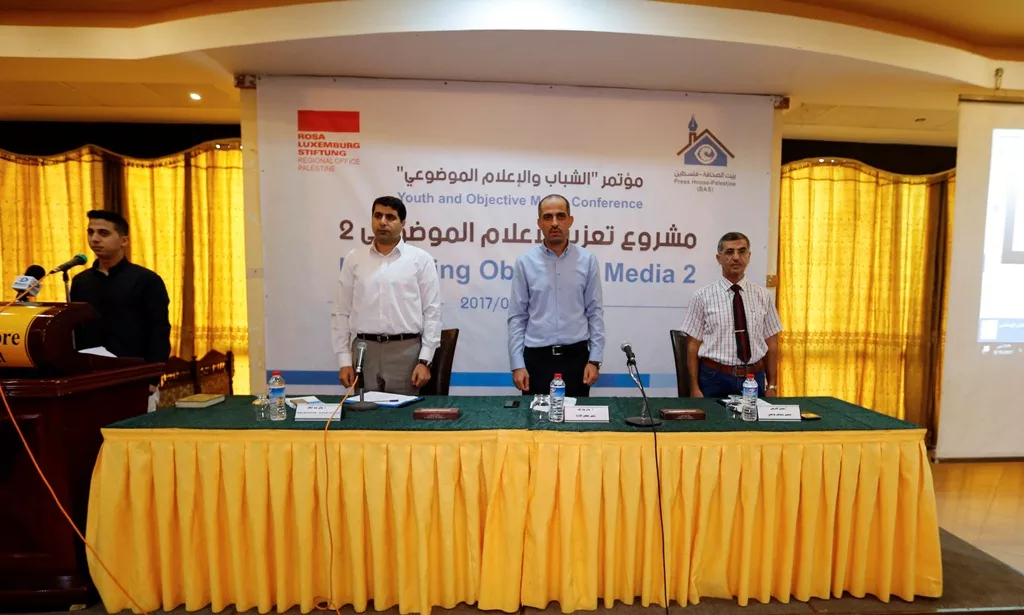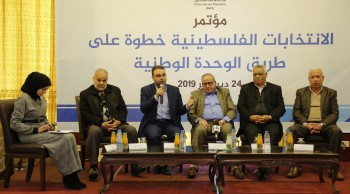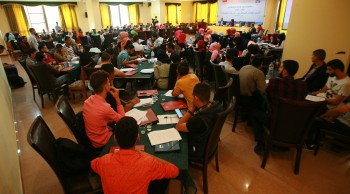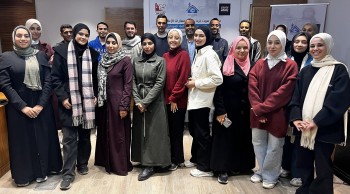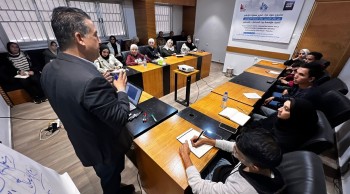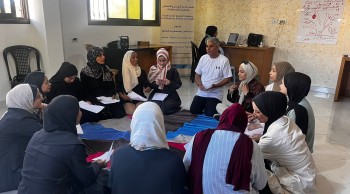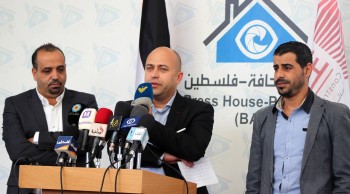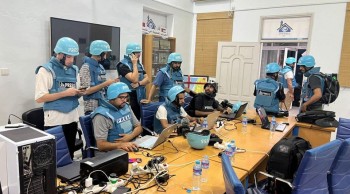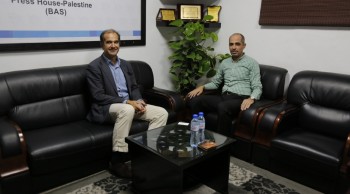19/08/2017--- Gaza, Press House-Palestine held a conference entitled " Youth and Objective Media", in the presence of media students and graduates from the different colleges in the Gaza Strip, within the activities of " Promoting Objective Media 2" Project funded by Rosa Luxemburg Foundation.
At the beginning of the conference, Mr.Belal Jadallah, Chairman of the Press House, stated that shedding the light on the objective media aims at creating transparent media through intensifying the training courses and educational sessions.
He added that "Promoting Objective Media 2" project, implemented by the Press House and funded by Rosa Luxemburg for the second year, aim at enhancing the objective media formed by the fresh journalists and graduates to promote the Palestinian cause.
Jadallah indicated the conditions of the Palestinian youth, saying; " the conditions of the youth are getting worse day by day due to the situation the Gaza Strip is facing. However, we still hold patience and hope that never give up on."
He also called for a Palestinian media speech, saying; " what we are seeking is the unity of the media organization, so that we could create a united Palestinian speech that is able to address the Israeli propaganda that is spreading lies and fake news."
Jadallah said; " In our coming plan, we will pay a great attention to youth panel and media graduates for a professional and objective media, praising the efforts of Rosa Luxemburg for supporting the projects.
After the speech of the Press House' Chairman, a video of the projects' activities was displayed for the audience.
During the first session, led by Nesma Al-Halaby, Dr.Muhsen Ifranji talked about the professional ethics and standards of media, stressing on the possibility of applying them in journalism.
He added;" we need a professional media that achieves the demands of Palestinians upon transparency, professionalism, and objectivity."
He also noted that the journalist is a human and has the right to belong to any idea under the condition of having professionalism and being away from factionalism."
Al-Ifranji followed; " the mistaken behaviors do happen, but it's so dangerous in media as it brings doubts to the reliability of media outlets.
He noted that the various factors that affect the ethics of journalism including Israeli and its violations committed against media and Palestinian people, political division, Journalists Syndicate division, and the political and factionalized parties for some media outlets.
" Ethics and standards of journalism requires more discussions and dialogues as well as brainstorming sessions, where all bodies participate to get results that enhance the professional standards and policies of media." He added
In his turn, Dr.Wael Abdel Aal, Head of Literature and Human Sciences in the University College for Applied Science, said;" studying the reality of media colleges and departments in the Gaza Strip and West Bank reflects the problem in the form and content of these plans."
He stated that the majority of the media programs have not made any progress in the academic quality or professionalism, as the majority of these plans are traditional and cannot be updated to keep the pace of media.
Abdel Aal highlighted the challenges the colleges and departments of journalism, noting that Gaza has 18 higher education organization that grant BA and Diploma degrees for all media branches without taking into consideration quality and quantity of participants.
He added;" one of the biggest challenges is to convey the theoretical sides away from the practical. Moreover, the infrastructure of laboratories, TV and Radio broadcasts, social media laboratories, and the poor educational staff in most of media departments."
Abdel Aal confirmed that the weakness in media and journalism departments is part of the general condition of education in the Palestinian territories.
During the second session of the conference led by Mohammad Daoud, Baker Al-Turkmany, investigation and Complaints coordinator for ICHR talked about the reality of voluntary work in media organizations.
He confirmed that the voluntary work plays a great role in the societal development and sparks an atmosphere of coherent social relations.
He added; " we understand the challenges the media sector is facing due to the political division and Israeli violations, but in advance we have to understand that the volunteer has his own ambitions, where he doesn't only want to go on voluntary work for a lifetime."
Al-Turkmany highlighted the risks of the voluntary work in the media organizations including the absence of officers who lead these volunteers during their work, and the general goals without specifying the roles and duties of the volunteers.
In his turn, Mr.Khaled Safy, Social Media expert, talked about social media tools and how to utilize them in promoting objectivity of media.
Safy stated that youth can make changes in the websites to be platforms of expressing opinions and attitudes.
He added;" Like button can affect the mentalities of youth, as the number of users of social media is getting bigger."
He also noted that the social media tools converted many youngsters to extravert and more violent.
Safy followed; " It's a necessity that media organizations cooperate with each other to find alternatives that help these users to get the information from reliable sources, especially before the traditional media leaders can affect the general opinion of people.
He said;" so many young activists follow specific factions, in a way that negatively affects the independency of them in publishing their opinions objectively on social media."
A plenty of recommendations published out of the conference as follows:
Calling for benefiting from the Tunisian experience in monitoring and documenting the extent to which journalists are committed to the ethics of journalism through the Journalism Ethics Observatory.
- Increasing the discussion and dialogue and organizing the brainstorming sessions to reach common visions in which everyone contributes and participates in the application of media professional and ethical controls results.
- Media organizations should be concerned through the administration and organization of voluntary work through the establishment of a special voluntary system or codes of conduct in this field which organize volunteerism and training in media organizations.
- Cooperation between the private, non-governmental, governmental and trade media organizations in order to develop a practical and technical approach for volunteering and training in the field of media, in addition to involving media departments in the Palestinian universities.
- Urgent need for a special law organizes voluntary work in Palestine as the Palestinian labor law did not address this issue.
- Activating the monitoring role of media union organization to protect volunteers and trainees and prevent their exploitation on the one hand, and organizing volunteerism and training on the other hand.
- Reconsidering the curricula of the journalism and media majors in all Palestinian universities by the Accreditation and Quality Authority at the Ministry of Education and Higher Education. Moreover, creating a comprehensive developmental plan whereby the media departments will be required to contain the plans and curricula to the reasonable extent of the applied content by 50%.
- Social Medial sites have made a large group of young people less social and more violent.
- Young people were able to change these sites to become platforms which express their thoughts and beliefs, regardless of the nature for which they were made for. ü "Like" button affects the youth mentalities a lot, and the average of youth existence on those platforms is increasing steadily with their desire to experience new platforms to waste the rest of their time.
- There is an urgent need to make journalism ethics and standards a public opinion issue in the light of the political, cultural and media changes witnessed by the Arab societies.
- The effective way for media immunization, so as not to become a platform for hatred speech and does not become a courier to convey the messages of extremism, is to improve media professionalism and independence.
- One of the incitement, hate and non-objective media sources is the race between citizen journalism and social media, on the one hand, and the press and the professional media on the other hand. The race which is connected to the rushing and getting the scoop.
- Political and social crisis times are an attractive environment for social and political polarization, spreading hatred and disdain for others.

